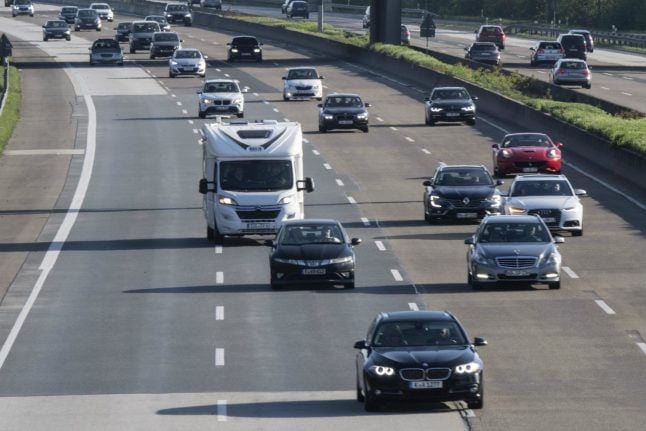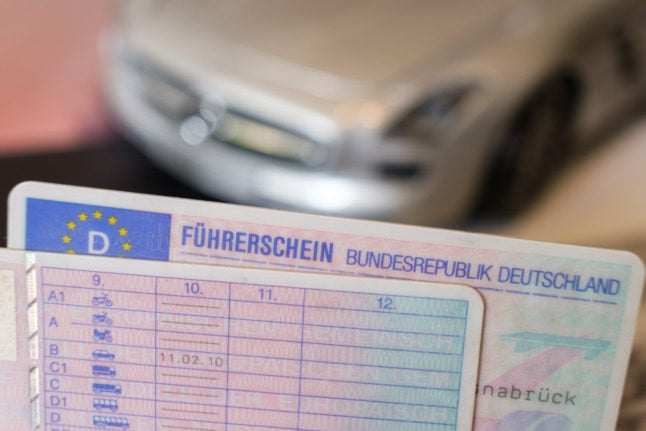Just over 70% of The Local readers reject the idea of imposing a general speed limit on Germany’s Autobahn, which is famous for having zones with no speed restrictions.
That’s the result of a survey we conducted to find out readers’ views. Proposals to impose speed limits on the highways have long divided the country.
Some argue that putting a general speed limit in place, often touted as 130km/h (80mp/h), would make roads safer and reduce carbon emissions.
However, for many people inside and outside Germany, the speed limit-free motorways are a strong part of the country's car-loving culture and history.
The debate was ignited earlier this week when the Green party put forward a motion in the Bundestag urging the government to install a general speed limit of 130km/h.
When we created a survey on the topic, dozens of people shared their views with us. And, after two days, the results are in: 70.1 percent do not want to see Germany impose a speed limit on its highways. A total of 26.7 percent said there should be a speed limit, while just over 2 percent said they weren’t sure.
Of those who completed our questionnaire, just over 80 percent said they’d driven on the Autobahn several times, 10 percent had driven on it a few times and 8.7 percent said they hadn’t tried it but would like to.
SEE ALSO: Eight things you never knew about the German Autobahn
'Freedom'
When we asked what comes to mind when you think of Germany’s Autobahn network, the majority of answers were positive responses.
Many people answered with “speed”, “no speed limit” or “fast”. Some readers said they associated the Autobahn with “freedom” and “Germany’s culture of driving”.
People called it “great”, “well-maintained”, “functional”, “efficient”, “safe”, “impressive” and “Germany’s best tourist attraction”.
One reader called it “the best Autobahn/highway in the world”, while another said: “I have driven in India, UK, Singapore, Dubai and Germany and I will say Germany has the best Autobahns.”
A respondent told The Local that the Autobahn is “a testament to German engineering, quality and innovation that is tried and has triumphed over the years”.
“The automobile industry's finest works are born to be enjoyed on this road. However I do speak for safety and wellness of others, so I believe there should be some moderation but not to damage the Autobahn legacy,” the reader added.
Another said that driving on the Autobahn was “a real pleasure”.
 A speed limit sign on the A24 near Suckow, Mecklenburg West Pomerania. Photo: DPA
A speed limit sign on the A24 near Suckow, Mecklenburg West Pomerania. Photo: DPA
'Inconsiderate drivers'
Others pointed out the not so great things. One respondent said the Autobahn had “a dwindling number of segments that still permit free speed, due to increasing congestion”.
Many people said traffic jams were a regular occurrence, while one respondent said the Autobahn had “inconsiderate drivers and speeders”.
Some people pointed out further negative sides, with a few people calling the highways “stressful” and “scary”
A respondent called the Autobahn “dangerous”, while another said there are “too many car crashes”, and an “incredible amount of portions under work or renovation”.
A reader pointed out that the road network had a lot of “potholes” and “impatient drivers”.
One respondent pointed out that there were “dangerous discrepancies in the speeds of vehicles”, while another said the roads were “safe and fair”.
Would a speed limit make the Autobahn safer?
For those who thought there should be a speed limit, 130km/h was the most common suggestion, however some people suggested 110 and 120km/h.
Some respondents said the system as it is — with sections that have no speed limit and other parts with restrictions — worked well.
Although the Autobahn network is the safest of all Germany's roads, some people say a general speed limit would make it even safer.
Earlier this week the Green party, in arguing for a change to the law, said speed limits prevent accidents, make traffic run more smoothly and can reduce carbon emissions.
But total of 63 percent of respondents to The Local's survey said they thought the Autobahn network wouldn’t be any safer with a general speed limit. Nearly 30 percent said it would be safer with more restrictions.
Almost 130 people took part in our survey which was live for just under two days this week.



 Please whitelist us to continue reading.
Please whitelist us to continue reading.
why 130? what is the scientific reason that 130 is the best limit?